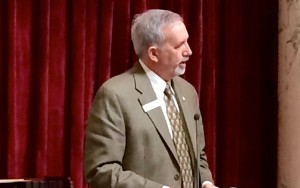One of the first things Sen. Dean Mortimer changed when he was appointed chairman of the Senate Education Committee was set his alarm clock to 4:30 a.m.

On the first day of the session, Gov. Butch Otter laid out a challenge to lawmakers: Increase public school funding by 7.4 percent and replace the state salary reimbursement grid with a new plan that raises pay and accountability.
Much of that work would fall to Mortimer, an Idaho Falls Republican, and his counterpart, House Education Committee Chairman Reed DeMordaunt, an Eagle Republican.
Education is not new to Mortimer, who started his career in the House on the education committee and spent the past three sessions on the Senate panel.
But when committee chairman John Goedde lost his re-election bid in May, it created an opening at the top spot. There were also three new members on the nine-member panel – freshmen Sens. Mary Souza, R-Coeur d’Alene (who defeated Goedde) and Lori Den Hartog, R-Meridian, and 10-term veteran Sen. Shawn Keough, R-Sandpoint.
Even with the promotion, Mortimer continued his role on the budget-setting Joint Finance-Appropriations Committee, affording him immeasurable influence over both the policy and financial side of the nearly $1.5 billion school budget, the state’s largest expense.
In order to live up to Otter’s challenge, Mortimer set two goals: 1. reaching out to all voices in the education arena; 2. managing his own time judiciously.
So he set his alarm clock ahead, which allowed him to arrive at the Statehouse by 6 a.m.
With Senate Education regularly the last committee to adjourn for the day, Mortimer’s schedule meant he didn’t see sunlight for most of the session. He arrived in the morning when it was dark, and he routinely left work at 7 p.m., when it was dark again.
On weekends, instead of driving back and forth to his Eastern Idaho home, Mortimer remained in Boise to work and arrive at the Statehouse well-rested on Monday mornings. He’d make the trip home only once a month.
“It’s extremely time-consuming,” Mortimer said. “I try to come in a little earlier in the morning, and I stay a little later this year and I didn’t do quite as many social events (in the evenings) as I had done.”
Building the career ladder

During career ladder negotiations, Mortimer met with his committee’s two Democrats weekly to solicit their feedback and update them on pending drafts, said Sen. Janie Ward-Engelking, D-Boise.
“I know he met with many of the stakeholders, and he was very generous about meeting with the minority party, (Sen.) Cherie (Buckner-Webb) and myself almost weekly,” Ward-Engelking said.
A career ladder bill didn’t materialize until the 52nd day of the session, partially because lawmakers such as Mortimer and DeMordaunt, state officials and education groups were meeting behind the scenes to negotiate a plan.
The first bill was scrapped and redrafted two more times to reflect concerns from lawmakers and education groups.
Leaders of the Idaho Education Association and Idaho Association of School Administrators Executive Director Rob Winslow said Mortimer and DeMordaunt’s efforts to include them at the negotiating table and address their concerns were big factors in the career ladder evolving from a polarizing proposal to one that eventually enjoyed widespread support.
Winslow, in particular, praised Mortimer’s role in the negotiations, calling him “deliberative, thoughtful and inclusive.”
“From a stakeholder’s standpoint, my view is any time legislators work with you, you always appreciate that, to have a voice,” Winslow said. “The other thing it does is sometimes if you don’t work with stakeholders and run a bill and kind of do you own thing, if it’s an issue we disagree on, then we have to publicly come out against these elements of a bill.
“When we can negotiate or get some adjustments or some things worked out, it is always easier if there is more front-end work with the stakeholders,” Winslow continued.
Ward-Engelking agreed, saying that even when she and Buckner-Webb disagreed with Mortimer, he sought out their perspective and listened.
“He was very inclusive and he listened,” Ward-Engelking said. “Many of those changes were ultimately made, and I enjoy working with him.”
Among Statehouse insiders, Mortimer’s role in career ladder negotiations was even more appreciated because of the personal obstacles he overcame to carry the legislation.
After DeMordaunt shouldered the load of carrying the career ladder through its first two obstacles – House Education and the House floor – Mortimer became ill, was hospitalized and underwent an unplanned but non life-threatening surgical procedure.

Doctors operated on Mortimer March 22, a Sunday, and he returned to work ahead of schedule on that Wednesday to lead the bill through Senate Education and then again the next day to carry it on the Senate floor.
“That added an even greater burden to his already heavy workload,” said Sen. Brent Hill, the Senate’s No. 1 ranking Republican. “I just think he’s one of the heroes of this legislative session.”
Mortimer discussed his surgery with Idaho Education News but asked the details of the procedure not be shared in the media. He said he is doing much better now, to the point where we walked about two miles one morning last week.
“Last week I got a clean bill of health,” Mortimer said. “I am very blessed.”
Answering the governor’s challenge

Sen. Steven Thayn, an Emmett Republican who sits on the Senate Education Committee, said lawmakers met Otter’s challenge in several ways. He points to the career ladder and the 7.4 percent increase in education spending, as well as continued work to make advanced college courses available to students still in high school.
“Three, four years from now we will see how significant it is,” Thayn said. “I think when we look back on this session you’ll be able to say ‘you did a good job.’”
Keough — who was new to Senate Education this year, but who sat on that committee earlier in her career — agrees the challenge was met.
“(Mortimer) has some natural skills in patience and mediation, which were beneficial in guiding and shepherding that process,” she said. “He worked to try to keep folks that maybe weren’t on the front lines of the discussion up to speed.”
For his part, Mortimer said he did his best to answer Otter’s challenge. But he gave much of the credit to DeMordaunt and his Senate leadership team of Hill and Sens. Bart Davis, R-Idaho Falls, Chuck Winder, R-Boise and Todd Lakey, R-Nampa, — saying they bent over backwards to support him and provided a consistent vision.
“I think the general public should see the challenge and the Legislature rose to the challenge by two means,” Mortimer said. “No. 1 was passing the career ladder and No. 2 was setting a budget at 7.4 percent, basically the governor’s budget. These were not small things and it took a long time to get the House (members) to a point where they were willing to accept that large of a contribution to education.”
With the legislative session behind him, Mortimer plans to return to his family’s development business, Idaho Falls-based Comfort Construction, and take a trip to celebrate his 40th wedding anniversary with his wife, Judy.
While he can push the alarm clock back from 4:30 a.m. this summer, education policy won’t be far from Mortimer’s mind. When he returns next year, he plans to focus on finding funding for the next year of the career ladder and to return operations funding, sometimes called discretionary spending, to at least pre-recession levels from 2009.
It is good that Mortimer is focused, Hill says, because the Legislature may need to rely on another big push next year.
“It was a huge workload, and he did a magnificent job,” Hill said. “I just hope we didn’t burn him out.”
